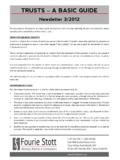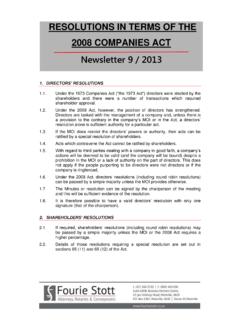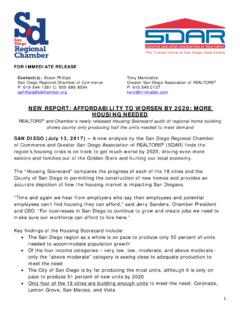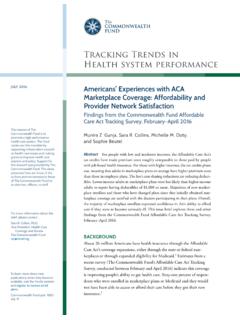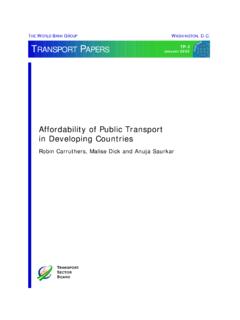Transcription of AFFORDABILITY ASSESSMENTS IN TERMS OF THE …
1 AFFORDABILITY ASSESSMENTS IN TERMS OF THE national CREDIT ACT Newsletter 8 / 2012 Section 81(2) of the national Credit Act states that a credit provider must not enter into a credit agreement with a proposed consumer without first taking reasonable steps to assess: (a) the proposed consumer s - (i) general understanding and appreciation of the risks and costs of the proposed credit, and of the rights and obligations of a consumer under a credit agreement; (ii) debt re-payment history as a consumer under credit agreements; (iii) existing financial means, prospects and obligations; and (b) whether there is a reasonable basis to conclude that any commercial purpose may prove to be successful, if the consumer has such a purpose for applying for that credit agreement. Section 82 of the national Credit Act states that a credit provider may determine for itself the evaluative mechanisms or models and procedures to be used in meeting its assessment obligations under section 81, provided that any such mechanism, model or procedure results in a fair and objective assessment.
2 It does not appear that the national Credit Regulator has issued any guidelines to assist credit providers in this regard. In essence, the credit provider must confirm four important issues (which are discussed below) regarding the consumer and the transaction: 1. understanding 2. credit history 3. AFFORDABILITY 4. commercial purpose 1. UNDERSTANDING Sections 63 to 66 of the national Credit Act protect the consumer by stating that: 1. All documents in TERMS of the national Credit Act must be in an official language that the consumer reads or understands, having regard to issues such as reasonableness, usage, practicality, expense and regional circumstances. P a g e | 2 2. All documents must be in plain and understandable language. The test is that an ordinary consumer of the class of person for whom the document is intended and who has average literacy skills and minimal credit experience, must be able to understand the content, significance and import of the document.
3 3. The credit provider must deliver the document to the consumer or make the document available to the consumer free of charge. 4. The credit provider must not discriminate against, penalise or take any detrimental steps against any consumer who seeks to exercise, assert or uphold any right in TERMS of the national Credit Act. 2. CREDIT HISTORY A credit provider must take steps to inspect the proposed consumer s credit history as recorded by the credit bureaux. In TERMS of section 70 of the national Credit Act, the credit bureaux must keep accurate records regarding a person s credit history and financial history. 3. AFFORDABILITY This is a very important factor and ASSESSMENTS are often not done properly by credit providers. Section 78(3) of the national Credit Act defines financial means, prospects and obligations as including: (a) income, or any right to receive income, regardless of the source, frequency or regularity of that income, other than income that the consumer or prospective consumer receives, has a right to receive, or holds in trust for another person; (b) the financial means, prospects and obligations of any other adult person within the consumer s immediate family or household, to the extent that the consumer, or prospective consumer, and that other person customarily - (i) share their respective financial means; and (ii) mutually bear their respective financial obligations; and (c) if the consumer has or had a commercial purpose for applying for or entering into a particular credit agreement, the reasonably estimated future revenue flow from that business purpose.
4 If a proper AFFORDABILITY assessment is not conducted and if the consumer was over-indebted (as defined in section 79 of the national Credit Act) at the time the agreement was entered into, the credit agreement will be reckless and may result in severe penalties for the credit provider and an increase in bad debt. P a g e | 3 In conducting an AFFORDABILITY assessment, the credit provider should look at: 1. The consumer s: (a) record of payments in the past in respect of all credit agreements entered into by that consumer; (b) income; (c) regular expenses such as school fees, groceries and traveling costs; (d) current debt and the repayment of this debt; (e) employment prospects; (f) residence; (g) age; (h) marital status. 2. the transaction and why credit is needed (if it is a business venture, all details of the venture should be obtained, including a feasibility study and a business plan) 3. The influence of any economic variables.
5 4. COMMERCIAL PURPOSE It may be that a consumer is unable to afford monthly instalments under a credit agreement but, if the consumer requires funding for a particular commercial venture and it reasonably appears that this venture will be successful, this factor may be enough to justify the credit provider in concluding the credit agreement. The business plan and feasibility study for this venture must be carefully scrutinised. If a credit provider has any uncertainty as to whether it is compliant with the national Credit Act on this very important issue, proper advice should be sought from an attorney who is knowledgeable on the national Credit Act. NOVEMBER 2012

